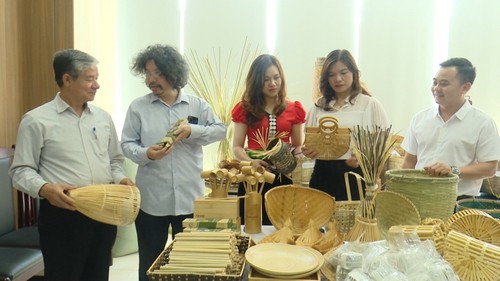 Son La develops new OCOP products to raise the ranking of its agricultural staples. (Photo: VOV) Son La develops new OCOP products to raise the ranking of its agricultural staples. (Photo: VOV) |
Spectacular scenery, beautiful cultural traditions, and friendly, hospitable people have made A Chu homestay an attractive place in Hua Tat hamlet, Van Ho district. Last year the place welcomed 10,000 tourists, 20% of them foreign.
This year A Chu homestay has registered to produce OCOP products, said owner Trang A Chu.
“I want to participate in the OCOP program to promote our cultural identity through tourist services and activities such as making paper, grinding corn to make a local dish called men men, and painting with beeswax. We can help more Mong people earn extra income.”
Bach tra may, a 5-star OCOP tea brand of Son La province, has won prizes at tea competitions in Europe, the US, and China.
Nguyen Thi Tham, Director of the Tea and Northwestern Specialties Company, said the OCOP program created an opportunity for the local tea to go global.
“Bach tra may is processed without using machines or modern equipment. The tea is self-fermented and dried under the sun and wind. The tea has a light scent of wild flowers and the sweetness of ripe fruit. We want more Vietnamese and foreigners to learn about this special tea, which doesn’t cause insomnia and is good for young and old,” said Tham.
Based on the OCOP Program Criteria for the 2018-2020 period, the set of criteria for the 2021-2025 period has been adjusted to match the development goals in the new period.
One change is that the assessment and classification of products will be done at the communal level instead of the district level. The district People's Committee will be authorized to certify 3-star OCOP products. Localities, businesses, cooperatives, and individuals have hailed the changes, which will make it easier to choose typical products and save time and cost in certifying them.
Cam Van Trinh of the Agriculture and Rural Development Office of Phu Yen district said, “The set of criteria has been adjusted to suit the situation and improve product quality. This year Phu Yen will reassess 8 OCOP products recognized in 2020. We aim to have 5 new OCOP products this year.”
The criteria for the OCOP registration dossier have also been simplified, with more specific instruction to encourage businesses, cooperatives, and households to join the OCOP program.
“This year each district and city aims to recognize at least 5 OCOP products. We intend to have 70-80 products certified with three or four stars,” Hoang Thi Thu Hien, Deputy Head of the Office for New Rural Areas Coordination in Son La province, said.
Son La province has set goals to develop OCOP products and raise products’ ranking by improving quality, value, and competitiveness.